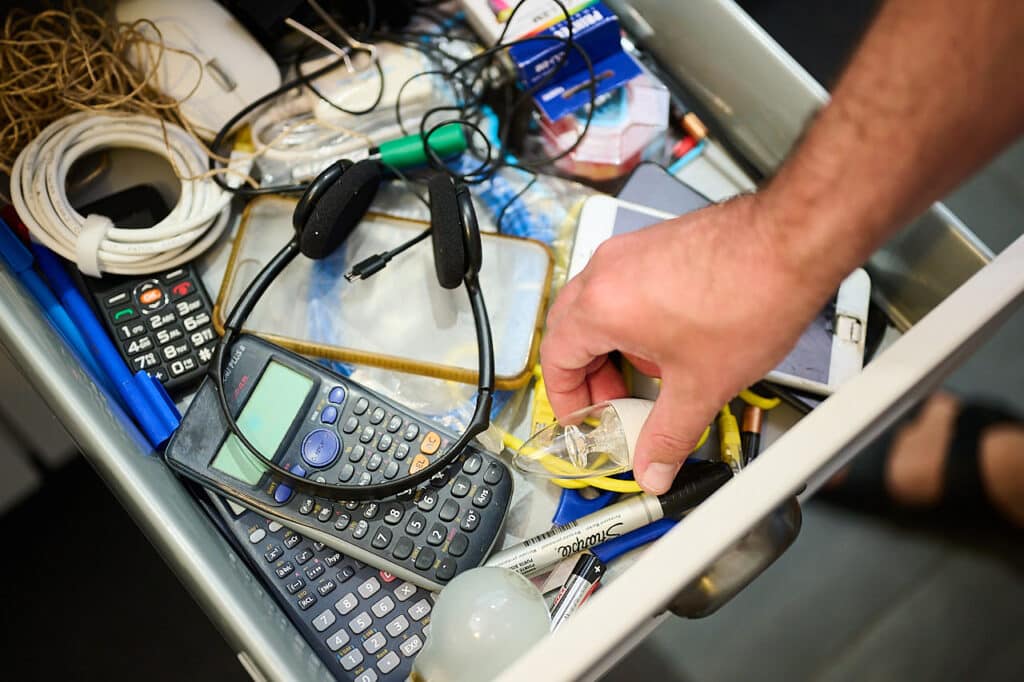Can you imagine a world without all the modern widgets and gadgets? From increased productivity and better communication, to cost savings and innovation, utilisation of new technologies has created a competitive advantage for Australian businesses.
However, the rapid uptake of technology in businesses and our everyday lives has created a new set of challenges, most notably managing these items at the end-of-life. As electronics and electrical items have become essential to the lives of most Australians, e-waste has become one of the fastest-growing waste streams in Western Australia. How many of us have a drawer stashed full of old mobile phones and other obsolete tech that we’re not sure what to do with? The question of what to do with all this e-waste becomes bigger when we’re having to manage old office equipment, batteries that have lost their charge, or we’re just looking to upgrade to the latest tech. Thankfully, there are lots of solutions available.
New e-waste regulations
Western Australia is the latest jurisdiction to ban a variety of types of e-waste from being sent to landfill. From 1 July 2024, e-waste service providers, large businesses, public entities, and landfill operators are prohibited from disposing of e-waste to landfill, and may have record keeping or reporting obligations. This includes items such as screens, information technology and telecommunications equipment, batteries, white goods and lighting. Responsible management of these items at end-of-life not only means you’ll be compliant with regulations, it also increases the recovery of valuable materials (like metals) in many electrical items which are lost when sent to landfill. While there are many issues at play, by taking proactive steps, businesses can significantly reduce their technological footprint, and the broader impacts on the environment.
It’s also critical that businesses keep cyber security top of mind while managing their e-waste, so that valuable data and sensitive information stored on their electronic devices is appropriately safeguarded. A 2023 report from PwC highlighted the growing concerns of businesses in relation to the insecure disposal of e-waste, especially when it is exported offshore. Local re-processors can provide accredited and verifiable data destruction, which ensures you are compliant with the Australian Privacy Principles to maintain privacy and confidentiality obligations.
In Western Australia, the state government is encouraging businesses of all sizes to get on board, by adopting smart e-recycling measures that can benefit not just the environment, but businesses too.

Here’s how your business can be part of the change:
- If you are a business owner or manager, educating employees is a great start. It’s important to provide guidelines on how to identify e-waste and where to dispose of it, and raise awareness among staff about the importance of recycling e-waste.
- Encourage employees to minimise their personal e-waste and to not throw items in their bins at home or work. Setting up collection points for smaller items like batteries helps to keep these items out of landfill.
- Promote responsible purchasing of electronic products by investing in high quality, long-lasting electronics to minimise future e-waste.
- Clear out that “tech drawer” that has been piling up in the office with old mobile phones and obsolete technology. Inform staff of the correct disposal routes of these items, so that they can do better than the bin.
- Take items to specialist drop-off locations , especially hazardous waste and e-waste items like batteries, light globes, computers and laptops, and mobile phones.
- Implement a responsible recycling policy and partner with e-waste recyclers. There are some companies who can come and collect from you on a regular basis, or you can request one-off pick-up as required.
- Invest in regularly maintaining equipment to extend the lifespan of tech products.
How can we embrace the circular economy at work?
Now more than ever, workplaces and businesses in Western Australia are embracing a green, circular economy. Everyday actions in the workplace, like using in efficient equipment can contribute to the rise of e-waste. But change starts small! By implementing simple practices, WA businesses and individuals can significantly reduce their e-waste footprint and drive a sustainable workplace future.
Be a GREAT Sort and remember, your business can do better than the bin. To find out more about other ways to make landfill the last resort, click here.

